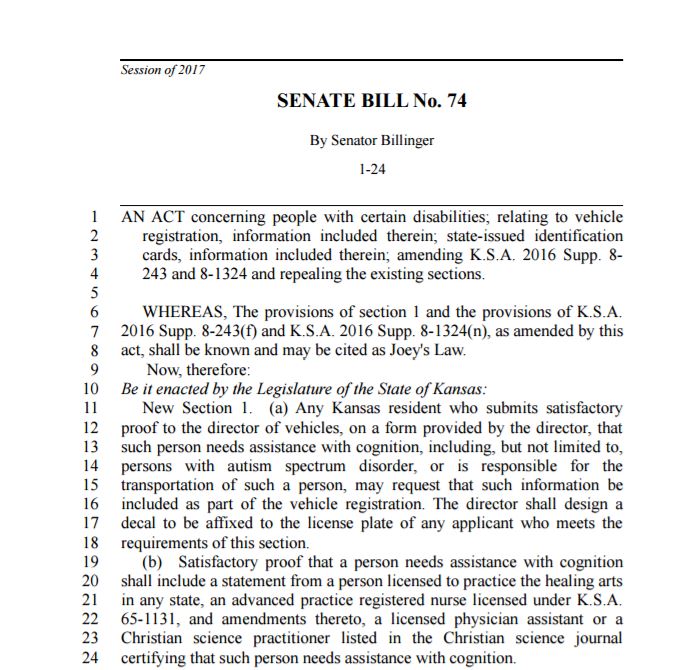
By BECKY KISER
Hays Post
A hearing for proposed legislation concerning Kansans with certain disabilities relating to vehicle registration is scheduled Wed., Feb. 15 in the Kansas Senate.
Senate Bill 74 was introduced Jan. 24 by 40th Dist. Sen. Rick Billinger (R-Goodland) and then referred to the Transportation Committee the next day.
Billinger, a freshman senator, introduced the bill in the aftermath of the Aug. 18, 2016 death of Hays resident Joey Weber. The 36-year-old man, who had autism, was shot and killed by a Hays police officer during a brief struggle following an attempted traffic stop for an expired license tag. The Kansas Bureau of Investigation determined HPD Sgt. Brandon Hauptman acted in self-defense.
“This bill is to hopefully make sure such a tragedy never happens again,” Billinger told the audience at Saturday’s legislative coffee presented by the Hays Area Chamber of Commerce.
SB 74 has four parts to it. All are voluntary and optional. Deaf and hard of hearing persons, military veterans and registered offenders in Kansas are also addressed.
The bill is focused on any Kansas resident who “needs assistance with cognition, including, but not limited to, persons with autism spectrum disorder, or is responsible for the transportation of such a person, may request that such information be included as part of the vehicle registration.” That person must submit “satisfactory proof (of needing) assistance with cognition” to the state director of vehicles.
People who are “deaf or hard of hearing may (also) request…a driver’s license which is readily distinguishable from drivers’ licenses…,” according to the propose bill. Kansas veterans “may request…a driver’s license which shall include the designation “VETERAN” displayed on the front of the driver’s license at a location to be determined by the secretary of revenue.”
“If someone who has autism or a similar type situation, they can apply to have a line item put on the registration of the vehicle that says this person has special needs,” Billinger explained. “We can also have it put on the driver’s license. In addition to that, a decal can be put on the license plate.”
Billinger has also drawn up an amendment that will be placed in the bill.
“We’re also going to offer a placard, similar to what you have hanging on your visor to park in a handicapped parking stall. It would be placed either on the sun visor or on the dash.
“In Joey’s case, the car he was driving wasn’t his. He was driving his father’s car because his pickup had mechanical problems. So, if this bill had been in effect, that automobile may not have had it on the registration, although it could have because it was his father’s car.
“Obviously, the police officer never got to Joey’s driver’s license, so that wouldn’t have done it.
“So, hopefully, the decal on the tag would have. When the officer gets ready to run that tag, he would have seen than decal and realized ‘special needs here.’ The placard could have been hanging where it would be visible.”
Billinger realizes some people may not want to put the decal on their car tag “for fear of maybe being targeted. That’s why we decided to offer the placard. That was one of our concerns about putting it on the license plate.”
“All four are optional. If people choose to, they can do this. If they don’t, they don’t. It’s not a mandate,” Billinger stressed. “We’re hoping with the four options, we’ll never have another incident like this happen.”
111th Dist. Rep. Eber Phelps, (D-Hays), a lifelong Hays resident, called it “one of the most unfortunate incidents that ever happened in Hays.”

Phelps said he had discussed the bill with Hays Police Chief Don Scheibler, who was in the audience at the Ellis Co. Administrative Center. Following the investigation of Weber’s death by the KBI, Scheibler said he “told the Weber family he will support their efforts for a law that would add special needs information to vehicle registration but said he believes it must be voluntary.”
“Unfortunately, in this incident with Joey, he was driving a vehicle with an expired tag…nevertheless, I support this legislation. There was similar bill introduced in the House (HB 2016) by Rep. Gail Finney from Wichita. If it can save other people down the road, I’m all for it and I will be supporting it. If the companion bill comes over from the Senate, I will support that as well.”
The House bill has been also been referred to its Transportation Committee, of which freshman 117th Dist. Rep. Leonard Mastroni, (R-LaCrosse), is a member.
“I support the Senate bill as well,” said Mastroni. “The House does have a companion bill. Sen. Billinger and John Weber (Joey’s father and an Oakley resident) came in and testified to the Transportation Committee. Between the two, I’m sure we’re going to get this taken care of.”
“We’re scheduled to work on this Tuesday,” added 110th Rep. Ken Rahjes (R-Agra), calling Weber’s death “extremely unfortunate.”
“We’ll pass it out of committee and then it’ll move forward. Hopefully, we can get this fixed.”
Both bills are known and cited as “Joey’s Law.”

Saturday morning’s first in a series of the HACC legislative coffees featured three new faces: Sen. Billinger, Rep. Mastroni, and the return of Rep. Phelps, who previously served 16 years in the Kansas House. Much of the forum addressed the state’s budget deficit. Hays Post will have more detailed information from the legislators later in the week.
HACC Executive Director Tammy Wellbrock, who served as forum moderator, says the next legislative update will be in March. A date has not been scheduled.
